History
The Vulture area - In the course of time
Giuseppe Silvestro
Translation by Mario Nenno
The pre-roman period
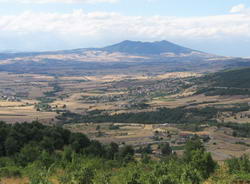 The earliest evidences of human presence in the Vulture area goes back to the Neolithic, while the first traces of a real civilization are related to the so-called “pre-roman” migrations. The first centers with populations of medium size were those close to today's cities of Melfi ("Afrodisia") and of Banzi that date back to the 8000 to 9000 BC when the Iapigi, an Illyrian tribe later named Dauni, coming from Anatolia (Asia Minor) to settle in a zone of the Apulian tableland that until today is named "Daunia".
The earliest evidences of human presence in the Vulture area goes back to the Neolithic, while the first traces of a real civilization are related to the so-called “pre-roman” migrations. The first centers with populations of medium size were those close to today's cities of Melfi ("Afrodisia") and of Banzi that date back to the 8000 to 9000 BC when the Iapigi, an Illyrian tribe later named Dauni, coming from Anatolia (Asia Minor) to settle in a zone of the Apulian tableland that until today is named "Daunia".
It was a Hellenistic population that was strongly joined to the horse culture which was introduced in this area according their tradition by their leaders King Dauno and of Diomede, a hero citied in Homer's Iliad as an excellent horse tamer.
In this context the Vulture area represents a natural boundary between the land of the forests and the wolves. Furthermore, its particular geographical position between Iripinia and Apulia had the advantage to be a defense shield and a point of control for the activities of the neighboring populations. The destiny of such frontier areas is, however, to be also a meeting point and melting pot of many populations, as it happened also to those who settled down here in the following centuries. The first to arrive were the Dauni which were later substituted by the Samnites 400 to 300 BC. Traces of their presence were found even at the border of territory of Melfi ("Melfites", in honor of the god of beauty to whom was attributed the power of healing and tonifying derived from the mineral waters that emerge from the springs of Mount Vulture) and especially at Lavello ("Forentum"), which was an important city at that time.
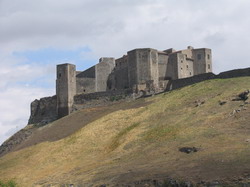
From this prosperous pre-roman time remained a number of findings that are conserved in the National Museum of Melfi located in the Castle of Melfi.
Roman Empire
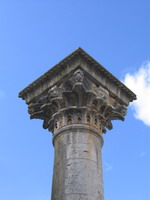 With the expansion of the Roman Empire and after the three Samnite wars in 300 BC began the long domination of the Vulture area as well as other southern parts of the Italian peninsula by the Romans. During this period there are no important inhabited centers since, according to the leading hypothesis, the local population has been moved to other, more easily accessible areas which were closer to the main roads of communication. As a consequence was founded the roman colony "Venusia", today named Venosa, which is said to be the birthplace of the famous Latin poet Quintus Horatius Flaccus (Horace). The Vulture area, however, never remained completely uninhabited. On the contrary, due to its important strategic position and its fertile soils a fortified camp was constructed close to the old city of Melfi with villas and large farms, that remains’ have been visible in the valleys around the Mount Vulture not only for a short time.
With the expansion of the Roman Empire and after the three Samnite wars in 300 BC began the long domination of the Vulture area as well as other southern parts of the Italian peninsula by the Romans. During this period there are no important inhabited centers since, according to the leading hypothesis, the local population has been moved to other, more easily accessible areas which were closer to the main roads of communication. As a consequence was founded the roman colony "Venusia", today named Venosa, which is said to be the birthplace of the famous Latin poet Quintus Horatius Flaccus (Horace). The Vulture area, however, never remained completely uninhabited. On the contrary, due to its important strategic position and its fertile soils a fortified camp was constructed close to the old city of Melfi with villas and large farms, that remains’ have been visible in the valleys around the Mount Vulture not only for a short time.
Medieval Times and the Normans
After the fall of the Western Roman Empire and after the Barbarian Invasions valid reports about the Vulture area were found in the middle ages demonstrated by the evidences of the presence of Langobards and Byzantine. In 1018 the city of Melfi was re-founded as a military fort by the Byzantine Captain Boioannes.
Shortly after, in 1041, the fort falls in the hands of the Norman leader William of Hauteville (known as Iron-Arm) and his brother Robert Guiscard. Since Melfi became the capital of the Normans of Apulia and a center of important events it experienced a rapid urban growth. In 1059 the city is the place of the first Council of Melfi where Robert Guiscard in the presence of Pope Nicholas II converted to Christianity and, in return, he and his family received the title Vassal of the Church of Rome and Prince of Sicily.
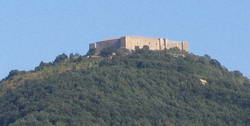
In the relationship between the Roman Church and the Normans the city of Melfi always played an important role. It was for many years the place where Vatican Councils were held, like the one convoked by Pope Urban II where numerous articles of the canon law have been approved and the participation of the Normans in the crusades was decided. The cooperation of the Normans and the swabian Hohenstaufern resulted in crowning Federico II the emperor of the German Empire and the King of Sicily. For Melfi this was a new period of cultural enrichment during which Federico II with his authority published by a commission his Liber Augustalis, also named Constitutions of Melfi.
Still in the middle ages, at the beginning of the 13th century, the number of monks and hermits increased, both those of western believes, like those following the Benedictine rules, but also Oriental or Basilian. Visible remainders are the Abbey of San Michele and the ruins of Sant'Ippolito at the lakes of Montichio, as well as the numerous chapel-in-the-rocks decorated with frescos close to Melfi and Rapolla, like Santa Margherita or Santa Lucia and many more distributed all over in the forests of the Vulture.
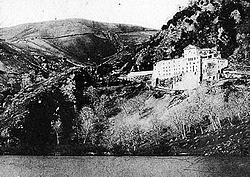
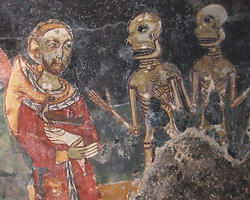
The loss of the power of Federico II did not mean only the loss of power for the city of Melfi but for all the Vulture area. From that moment on a decline began which was characterized by different foreign dominations, starting from the Anjou of the Kingdom of Naples and subsequently the Bourbons who regarded the area only as fief for the respective crown. The city of Melfi, which was the most important center of the area, first became the fief of the Acciaiuoli family from Florence, then the one of the Caracciolo, and lastly in 1531 it was given to the prince of Genoa, Andrea Doria, as a gift of the Spanish crown for the close collaboration in the defense of the control of Italy against the French.
During the unification of Italy the Vulture area faced the same problems as the rest of South Italy: poverty, unemployment and illiteracy, and being trapped by the surrounding mountains. Everything seemed to depend completely on the few pseudo-aristocratic families who knew only to exploit the population and the few resources like it was illustrated in detail by Giustino Fortunato from Rionero and later by Francesco Saverio Nitti from Melfi.
Brigands
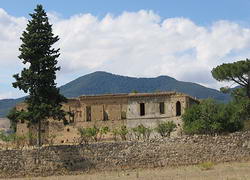 In this particular social climate grew the number of brigands (bandits) rebelling against the Bourbons with the center of this movement at Rionero in Vulture, Atella, and Rapolla. The brigands of this zone, like e.g. the famous Crocco from Rionero, found shelter in the forests of the Vulture area which represented a region out of the military control from Piemonte during several periods between 1861 and 1863.
In this particular social climate grew the number of brigands (bandits) rebelling against the Bourbons with the center of this movement at Rionero in Vulture, Atella, and Rapolla. The brigands of this zone, like e.g. the famous Crocco from Rionero, found shelter in the forests of the Vulture area which represented a region out of the military control from Piemonte during several periods between 1861 and 1863.
The present
Today the Vulture area is the driving force in the north of the Basilicata and the place of an industrial center grown around the car production factory of FIAT S.a.t.a. at San Nicola close to Melfi. Melfi is expecting to receive a form of a regional autonomy with the title of the third province of the Region of Basilicata, the Province of Melfi.
- Dentro la mura
- La chiesa rupestre di S. Margherita
